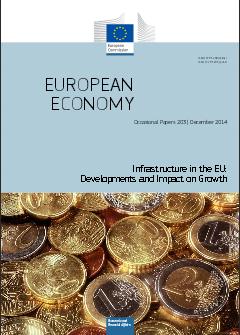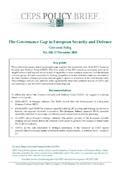Buti, M. (2014) “Lacklustre investment in the Eurozone: The policy response“, VoxEU Organisation, 22 Δεκεμβρίου. Weak investment is a key macroeconomic problem in the Eurozone, and the new European Commission has proposed an ‘Investment Plan’ to complement existing policy initiatives. In this column, the Commission’s Chief Economist explains the key rationale behind the Investment Plan. Weak investment has been the main source of weakness in the Eurozone recovery (European …Read More
The sham of central bank independence
Mitchell, B. (2014) “The sham of central bank independence“, Bill Mitchell Blog: Modern Monetary Theory – Macroeconomic Reality, 23 Δεκεμβρίου. Let it be noted that the Japanese government 10-year bond yield hit 0.33 per cent overnight. That tells you that all the scaremongering that has been going on over the last twenty years about hyperinflation, the Japanese government running out of money, the bond markets dumping the yen, and …Read More
ECJ legal rulings designed to help the Eurozone are threatening the accountability of European governance
Beck, G. (2014) “ECJ legal rulings designed to help the Eurozone are threatening the accountability of European governance“, LSE EUROPP, 10 Δεκεμβρίου. One of the most controversial issues during the Eurozone crisis has been the extent to which policies aimed at resolving the crisis, such as the decision by the European Central Bank to adopt ‘Outright Monetary Transactions’ (OMT), comply with EU law. Gunnar Beck writes that the European …Read More
The European Union Is the Global Laggard on Basel III – the Basel Committee found the EU “materially non-compliant” with Basel III
Véron, N. (2014) “The European Union Is the Global Laggard on Basel III – the Basel Committee found the EU “materially non-compliant” with Basel III“, Bruegel Institute, 08 Δεκεμβρίου. On Friday, December 5, the Basel Committee on Banking Supervision published its reports on the compliance of rules adopted last year in the European Union and in the United States with its global accord on banking regulation, adopted in 2010 …Read More
Τhe Sense and Nonsense of Eurozone Level Democracy
Verhelst, S. (2014) “Τhe Sense and Nonsense of Eurozone Level Democracy“, Egmont Paper 70, Royal Institute for International Relations, Οκτώβριος. EXECUTIVE SUMMARY The democratic functioning of the EU is frequently called into question. Increasingly, the focus of this criticism is the perceived lack of legitimacy in eurozone policy-making. The eurozone has gained a firmer grip on national policy-making in recent years, but has not adapted its democratic structure to …Read More
Europe: When the Unthinkable Becomes Possible
Europe: When the Unthinkable Becomes Possible, Geopolitical Diary – STRATFOR Global Intelligence, 03 Δεκεμβρίου. Europe’s economic crisis is slowly but steadily eroding the political systems of many countries on the Continent. New actors are emerging and threatening the supremacy of the traditional players. Alliances and events that seemed impossible only a few years ago are now being openly discussed across Europe. On Dec. 3, for example, Sweden announced it …Read More
Infrastructure in the EU: Developments and Impact on Growth
Brons, Μ., Kalantzis, F., Maincent, E. & Arnoldus, P. (2014) “Infrastructure in the EU: Developments and Impact on Growth“, European Economy – Occasional Papers–No. 203, European Commission Publications, Δεκέμβριος 2014: Βρυξέλλες. Today, investment needs are high in areas such as research, innovation and ICT which are important drivers of growth and competitiveness. However, there are also arguments to suggest that Europe should invest in energy and transport infrastructure. Energy …Read More
Investment as the key to recovery in the euro area?
Gros, D. (2014) “Investment as the key to recovery in the euro area?“, Economic Policy, CEPS Policy Briefs Νο. 34, 18 Νοεμβρίου. Investment has declined in the euro area since the start of the economic and financial crisis, but this does not mean that there is necessarily an ‘investment gap’, explains Daniel Gros in this CEPS Policy Brief. Investment was probably above a sustainable level due to the credit …Read More
The European Commission’s stronger role in economic governance has made it an unexpected ‘winner’ from the Eurozone crisis
Bauer, W. M. & Becker, S. (2014) “The European Commission’s stronger role in economic governance has made it an unexpected ‘winner’ from the Eurozone crisis“, LSE EUROPP, 02 Δεκεμβρίου. Several commentators have argued that the Eurozone crisis has resulted in more intergovernmental EU decision-making, with the European Commission in particular being weakened by the role taken on by the European Council in the area of economic governance. Michael W. …Read More
The loaded language of austerity – but all the sinners are saints!
Mitchell, B. (2014) “The loaded language of austerity – but all the sinners are saints!“, Bill Mitchell Blog, 27 Νοεμβρίου. The US National Institute of Justice tells us that – Recidivism is “is one of the most fundamental concepts in criminal justice. It refers to a person’s relapse into criminal behavior, often after the person receives sanctions or undergoes intervention for a previous crime”. You know murder, rape, theft, …Read More






